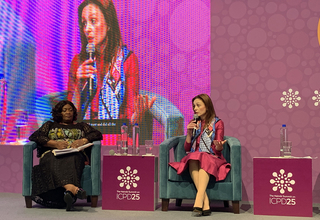Young people discuss ways to track progress on youth-related global goals at meeting in Sofia
4 December 2017
SOFIA, Bulgaria – Youth leaders from across Europe and Central Asia have gathered in Sofia today for a three-day meeting on developing a regional monitoring system to track progress on youth-related goals and targets included in Agenda 2030 and the Programme of Action of the International Conference on Population and Development.
“Empowering young people to fulfill their potential is key to the success of the Sustainable Development Goals,” said Ian McFarlane, Deputy Regional Director for Eastern Europe and Central Asia for the United Nations Population Fund (UNFPA). “But we don’t have the means to properly measure the progress we make in the region. This is why we invited young people themselves to help us develop a system that responds to their needs.”
Participants will identify and prioritize young people’s needs and challenges in the region related to health, education, employment and civic engagement, and examine how progress on these issues can be assessed in line with targets and indicators framework for the ICPD and SDGs. The meeting, titled “SDGs for Young People, Young People for SDGs,” will conclude on 6 December with the launch of a regional advocacy platform on youth, and with the election of a young representative as a member of the United Nations Economic Commission for Europe experts group on regional monitoring framework on ICPD.
Youth aged 15 to 24 years comprise nearly 30 per cent of the total population of the Europe and Central Asia region, which is also home to a large number of children from vulnerable and disadvantaged communities and groups. Young people in the region are disproportionately affected by unemployment, and face challenges in access to education and participation in national and local decision-making. Many are also at high risk of poor sexual and reproductive health.
“Rates of new HIV cases and other sexually transmitted infections are on the rise among young people in Eastern Europe and Central Asia,” said Anina Chileva, head of the international institute for youth development PETRI–Sofia, part of Bulgaria’s National Centre of Public Health and Analyses and one of the co-organizers of the meeting. “And the adolescent birth rate in the region is three times higher than in the older EU member states, with serious impacts on girls’ education, health and long-term employment opportunities.”
During the Sofia meeting, young people and other participants, including representatives of youth-led organizations and civil-society organizations as well as policymakers, statisticians, regional partners, local authority representatives and representatives of UN agencies, will work to create a framework for youth advocacy and lobbying on these issues both nationally and regionally. Possibilities for cooperation between countries in addressing the needs of young people will also be on the table at the meeting, which is jointly organized by Bulgaria’s National Centre of Public Health and Analyses, PETRI–Sofia and UNFPA’s Eastern Europe and Central Asia Regional Office.
“Young people need a structured mechanism for participation in decision-making, especially in areas that have a clear impact on young people,” said UNFPA’s McFarlane. “With the right political commitment and adequate fund allocation, young people can help transform the world into a better place for all.”
For more information, please contact:
Yuliya Andzhekarska
PETRI–Sofia Youth Coordinator
+359878569577
Marta Diavolova
UNFPA Programme Adviser, Strategic Partnerships
+902127053659




